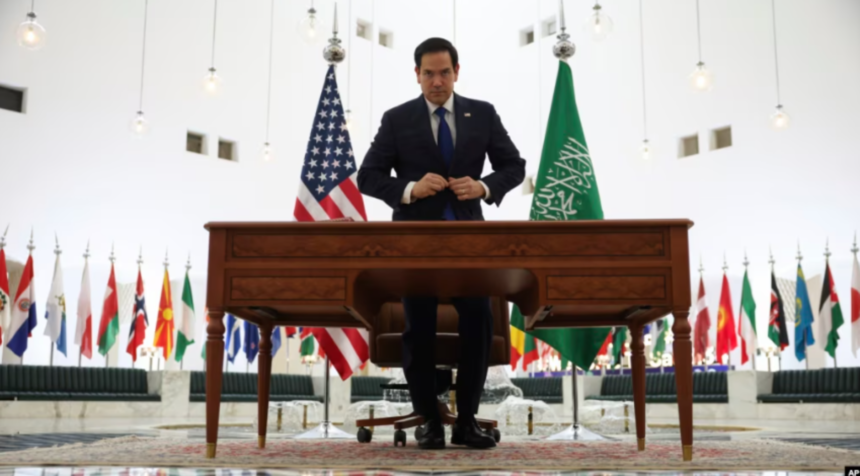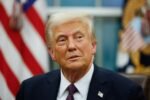U.S. and Russian officials will hold high-level meetings in Saudi Arabia aimed at ending Russia’s war in Ukraine, as well as discussing other issues that have escalated tensions between Washington and Moscow, which could shape the security situation in Europe in the coming years.
The meeting on February 18 in Riyadh will take place after the intensification of U.S. efforts to end the nearly three-year war in Ukraine, though the tactics have shaken diplomatic circles in Kyiv and Europe, as there is uncertainty about the type of agreement that could be reached to end the war.
“This is meant to be the first step in a long negotiation process, but things are moving quickly,” said Nigel Gould-Davies, a former British diplomat who is currently a senior researcher at the International Institute for Strategic Studies, in responses to Radio Free Europe.
“There is a momentum that will continue to move forward in these times of uncertainty.”
Who will participate in the talks in Riyadh?
The talks between the two countries are the first high-level meetings in recent years, aiming to pave the way for a summit between U.S. President Donald Trump and Russian President Vladimir Putin.
Russian Foreign Minister Sergey Lavrov and Yury Ushakov, the foreign policy advisor to President Putin, will represent Russia.
The U.S. has confirmed that U.S. Secretary of State Marco Rubio, National Security Advisor Mike Waltz, and Special U.S. Envoy for the Middle East Steve Wikoff will make up the U.S. negotiating team.
The American delegation does not include retired General Keith Kellogg, the White House special envoy tasked with negotiating a solution to the war.
Ukrainian President Volodymyr Zelensky has not been invited to the talks and has stated that Kyiv will not accept any agreement reached for Ukraine without Ukraine being present at the negotiating table.
Zelensky, who is currently on a visit to the Middle East, including the United Arab Emirates, Saudi Arabia, and Turkey, confirmed that Kellogg will arrive in Kyiv on February 20 for “long talks on security guarantees.”
What’s on the agenda in Saudi Arabia?
Rubio stated in a CBS interview on February 16 that the meetings in Riyadh aim to open long-term negotiations “including Ukraine and the end of the war.”
However, discussions between Rubio and Lavrov are expected to be broader than just Ukraine and could include relations between Moscow and Washington, sanctions, energy issues, and security matters.
Rubio also said that European governments and Kyiv will be involved in negotiations if they make progress after the meeting with Lavrov in Riyadh.
“If these are real negotiations – and we don’t know that yet – but if they happen, Ukraine will need to be involved because they are being occupied, and the Europeans will need to be involved because they have sanctioned Putin and Russia, and they will contribute to these efforts,” he said.
Before leaving for Saudi Arabia, Lavrov stated on February 17 that Russia is not considering giving up the territory it has seized in Ukraine.
Meanwhile, European leaders met in Paris at an urgent summit for Ukraine and defense issues, and Lavrov said he saw no reason for the Europeans to be involved in the discussions.
“Nothing significant will be achieved until Trump and Putin are in the same room,” said Andrew D’Anieri, a senior researcher at the Atlantic Council, in responses to Radio Free Europe.
“This means there is still time and many opportunities for Europeans and Ukrainians to shape the ideas of the Trump administration.”
What about statements to end the war?
During his election campaign, Trump promised to end the war in Ukraine very quickly, and now his administration aims to fulfill that promise within the first 100 days of taking office.
The talks in Saudi Arabia will take place after a series of statements made by him and U.S. officials in recent days regarding the war in Ukraine.
On his first official trip to Europe since taking office, U.S. Secretary of Defense Pete Hegseth stated on February 12 in Brussels that Washington does not support Ukraine’s NATO membership as part of a peace deal and that it is unrealistic for Kyiv to return to the borders it had in 2014, before Russia annexed Crimea and eastern Ukraine.
Hegseth also stated that European military forces should be the primary force to ensure security after the war in Ukraine ends, and that U.S. military troops would not be involved.
On the same day, Putin and Trump held a phone call, which the U.S. president described as a sign of ending Russia’s diplomatic isolation, as the two leaders were said to have discussed “economic cooperation” and Trump called for Russia’s return to the Group of Seven (G7) industrialized nations.
Russia was excluded from this group after annexing Crimea in 2014.
Where does Russia stand?
Initially, Putin aimed to capture Kyiv and install a pro-Moscow government.
Since this plan failed, the Kremlin has been adamant about trying to seize as much Ukrainian territory as possible and weaken Ukraine’s military capacity.
During the phone call, Putin told Trump that he wants to address “the reasons for the conflict,” signaling that Russia has abandoned the idea of preventing Ukraine’s integration with the West.
“If I were Putin, I would try to leverage the U.S. willingness to see if I could get as close as possible to my maximal positions, which I’ve had since the start of the war,” said John Hardie, a Russia expert at the Foundation for the Defense of Democracies, a Washington-based institute, in responses to Radio Free Europe.
Gould-Davies, the former British diplomat, said that the Kremlin may push forward demands similar to those made in 2021, before the full-scale war began.
At that time, Lavrov had requested in talks with the U.S. that Ukraine be denied NATO membership and that weapons and troops be withdrawn to positions they held in 1997, before the alliance’s eastward expansion.
“Putin has been clear that he is not interested in a ceasefire; he only wants an end to the war,” said Gould-Davies.
“This means a sort of solution to the fundamental issues and the creation of a new regional order that may be more favorable to Russia.”







